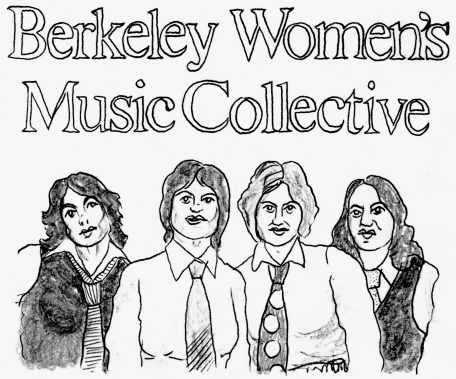
Das Berkeley Women’s Music Collective hat in den 70er Jahren bei Windbag Records 2 Alben veröffentlicht, "Berkeley Women’s Collective" 1976 und "Tryin’ To Survive" 1978. I was born a bastard / You know my mother she couldn't keep me / Sent me off to a foster home / Where they tried to teach me / That girls can't go climbing trees / Or playing with certain toys / Got to stay in dresses / Else they're called tomboys / Well I can sing it loud now / I can sing it loud now / Can sing it loud now / Gay and proud. Das Berkeley Women’s Music Collective bestand aus Nancy Henderson (Vocals, Guitar), Nancy Vogl (Vocals, Guitar, Bass), Susann Shanbaum (Vocals, Harmonica, Guitar, Bass) und Debbie Lempke (Vocals, Drums, Percussion). Der Song "Gay And Proud" wurde von Debbie Lempke geschrieben und wird auch von ihr gesungen. When I got adopted / You know they sent me to a shrink / Couldn't understand why I cut my hair short / Why I didn't want to wear pink / As I grew bolder / Got to be a desperate situation / People coming up to me at school / Say 'You ought to get an operation' / Well I can sing it loud now / I can sing it loud now / Can sing it loud now / Gay and proud. Windbag Records war das eigene kleine Label des Berkeley Women's Collective und die Alben wurden über das größere Label Olivia Records vertrieben. Olivia Records wurde im Jahr 1972 in Washington D.C. von 10 Feministinnen gegründet, die davor in der communal lesbian group The Furies Collective organisiert waren. Olivia Records veröffentlichte Musik von Frauen und bildete auch Produzentinnen, Tontechnikerinnen etcetera aus. Das erste Album, das bei Olivia Records erschien, war "I Know You Know" 1974 von Meg Christian. Das letzte Album war "Postcards From Paradise" 1994 von Cris Williamson & Tret Fure, ganz sicher bin ich mir da aber nicht. Nancy Vogl hat in den 80er Jahren dann noch die beiden Soloalben "Something To Go On" 1984 und "Fight Like The Dancer" 1986 veröffentlicht. When I was in my lonesome years / Kinda quiet intellectual / Womanfriend tried to bring me out / Had to hide when they cried 'homosexual' / Well I can sing it loud now / I can sing it loud now / Can sing it loud now / Gay and proud. Weitere Musikerinnen, die bei Olivia Records veröffentlichten waren Teresa Trull, Linda Tillery, Mary Watkins, Robin Tyler, June Millington, Deidre McCalla, Lucy Blue Tremblay, Margie Adam, Barbara Higbie, Alicia Bridges oder Dianne Davidson. I ain't sorry, I ain't sad / For all the years I've been had / Strutting 'round like a heavy-duty puff / Now I know we got to get tough / Well I can sing it loud now / I can sing it loud now / Can sing it loud now / Gay and proud. Die Musikerin Ginny Berson schrieb 1972 in der ersten Nummer der Zeitschrift The Furies: Sexism is the root of all other oppressions, and Lesbian and woman oppression will not end by smashing capitalism, racism, and imperialism. Lesbianism is not a matter of sexual preference, but rather one of political choice which every woman must make if she is to become woman-identified and thereby end male supremacy. Die beiden Alben des Berkeley Women’s Music Collective wurden leider nie neu aufgelegt, eine Schande. Weitere LGBT-related record labels waren oder sind Camp Records, Candy Ass Records, Chainsaw Records, Megatone Records, Mr. Lady Records, Outpunk oder Pink Biscuit Records. Yeah! Die Abkürzung LGBT steht für Lesbian, Gay, Bisexual und Transgender, falls das jemand nicht wissen sollte. So, jetzt noch die letzte Strophe von "Gay And Proud" und dann springen wir ins Jahr 1977. We women been waiting all our lives / For our sisters to be our lovers / Hey look around you now / Ain't you glad we finally found each other / Well I can sing it loud now / I am gay and proud. Oh yeah, eine Buchempfehlung hab ich auch noch, “Grosz Berlin New York” von Lars Fiske, es ist 2019 im Avant-Verlag erschienen und zeichnet in tollen Bildern die Geschichte von George Grosz auf. George Grosz: Ich stecke voll bis an den Hals hinauf mit Gesichten. Gute Nacht!